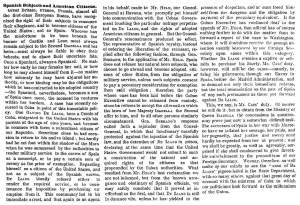Record Data
Transcription
Spanish Subjects and American Citizens.
Great Britain, France, Prussia, almost all the first-class European States, have recognized the right of their subjects to renounce their allegiance, and to become citizens of the United States; not so Spain. Whoever has the misfortune to be born beneath the banner of Castile and Leon must always remain subject to the Second ISABELLA and her heirs – must always be liable to obey their behests, and to share their uncertain fate. Once a Spaniard, always a Spaniard. No matter how early he may forsake her soil, or how long he may absent himself from it – no matter how solemnly he may have abjured her authority, or how binding may be the obligations which he has contracted to his adopted country – the Spaniard, nevertheless, becomes a son of Spain once more, the moment he ventures within her borders. A case has recently occurred in Cuba in point of this immutable policy. One GAVINO DE LIANO, born a Creole of Cuba, emigrated to the United States with his parents at the age of nine years, and became in common with them a naturalized citizen of our Republic. Sometime since he had occasion to return to his native island; but hardly had he set foot within the shadow of the Moro when he was summoned by the authorities to render military service to the crown of Spain as a conscript, or to pay a certain sum of money as the price of exemption. Regarding himself as a citizen of the United States, and not as a subject of the Spanish crown, DE LIANO bluntly refused either to render the required service, or to countenance the imposition by purchasing exemption from it. This contumacy led to his immediate arrest, and that again to an appeal in his behalf, made to Mr. HELM, our Consul-General at Havana, who promptly put himself into communication with the Cuban Government touching the particular outrage perpetrated on DE LIANO, and the rights of adopted American citizens in general. But the Consul-General’s remonstrance produced no effect. The representative of Spanish royalty, instead of ordering the liberation of the recusant, replied after the following fashion, through Gen. SERRANO, to the application of Mr. HELM. Spain does not release her natural born subjects, who choose to go abroad and become adopted citizens of other States, from the obligation of military service, unless such subjects consent to pay a pecuniary consideration for exemption from said obligation; therefore the party whose case has been laid before the Cuban Executive cannot be released from custody, since he refuses to accept the alternative which the laws of her Majesty ISABELLA the Second offer to him, and to all other persons similarly circumstanced. Gen. SERRANO’S response called forth a rejoinder from the Consul-General, in which that functionary manfully protested against the injustice of the Spanish law, and the detention of DE LIANO in prison, declaring at the same time that the United States Government would not submit to such a construction of the natural and acquired rights of its citizens as that propounded by the Cuban authorities. What resulted from Mr. HELM’S last reclamation we are not informed, but from the known arrogance and obstinacy of Spanish officials, we may safely conclude that it proved as ineffectual as the first, and that DE LIANO is still in durance vile, unless he has yielded to the pressure of despotism, and at once freed himself from the dungeon and the obligation by payment of the pecuniary equivalent. If the Cuban Executive has continued deaf to the appeals of Mr. HELM, that official has of course nothing further to do with the matter than to forward a report of the case to Washington, where it will doubtless receive the prompt attention usually bestowed by our Foreign Secretary upon cases within this category. Whether DE LIANO remains a captive or submits to purchase his liberty. Mr. CASS’ duty, however, will still be the same – namely, to bring his grievances, through our Envoy in Spain, before the Madrid Administration, and to demand not only their immediate redress, but the total renunciation on the part of Spain of any such pretensions as these put forward against DE LIANO.
This, we say, is Mr. CASS’ duty. Of course he will do it; but to obtain from the Ministry of Queen ISABELLA the concession in question, may prove just now a somewhat difficult task. The successes of Spain in her war with Morocco have so inflated her courage, her pride, and her pugnacity, that justice and mercy need hardly be expected from her at present; and we shall be greatly, as well as agreeably, surprised if she shall condescend to give favorable entertainment to the propositions of our Foreign Secretary. We may, therefore, as well make up our minds to see the “case of DE LIANO” pigeon-holed in the State Department, with so many others, against that great day of account with the mistress of Cuba to which our politicians look forward as the millennium of the Union.




